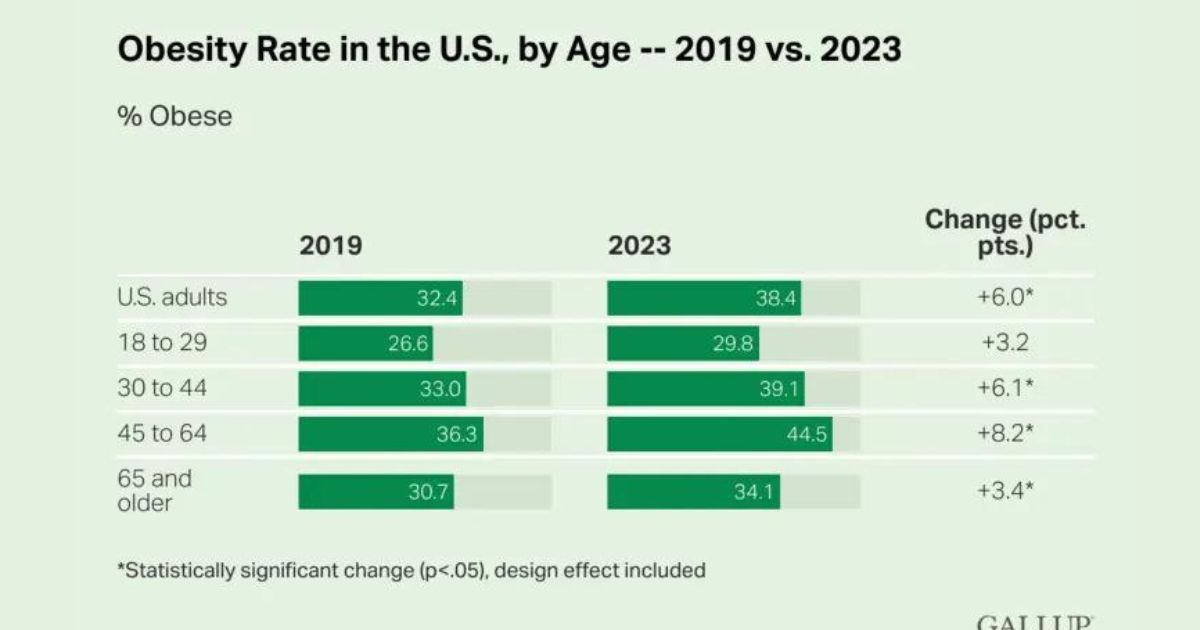A comprehensive Gallup poll conducted in August and September 2023 sheds light on the alarming decline in the overall health of Americans since the onset of the COVID-19 pandemic.
The study underscores the significant negative effects of remote work, changes in lifestyle, and the pervasive impact of COVID-19 on various aspects of health, including rising obesity rates, increased prevalence of diabetes, and a notable decline in mental health.
Decline in Overall Health
Obesity Rates Surge:
The report reveals a substantial increase in obesity rates, with an estimated 38.4% of the U.S. population struggling with obesity. This marks a 6% increase from 2019 and aligns with the record high of 39% recorded in the previous year.
The pandemic-related shift to remote work is identified as a contributing factor to modified health behaviors, resulting in a surge in obesity.
Rising Diabetes Rates:
Concurrently, rates of diabetes have increased by 1.1% since 2019, reaching an overall high of 13.6%. Specific age groups, particularly those between 45 to 64 and 30 to 44, witnessed the most significant increases in obesity, rising by 8.2% and 6.1%, respectively.
Mental Health Challenges:
The study delves into the mental health aspect, revealing that nearly 1 in 5 Americans is battling depression post-pandemic. The stressors of the pandemic, including remote work, social isolation, and uncertainty, have taken a toll on mental well-being.
Nutrition Takes a Hit:
Gallup statistics highlight a decline in proper nutrition, with a 5% drop in the number of adults eating healthily since 2019. The 30 to 44 age group experienced the most substantial decrease, plummeting by 9.2% from 44.5% to 33.5%. Furthermore, the consumption of fruits and vegetables saw a considerable decrease, indicating a concerning trend in dietary habits.
Impact on Economic Behavior:
The study associates unhealthy habits with economic impacts, emphasizing that individuals who report lower self-esteem are more likely to withdraw from public settings, leading to reduced spending.
The economic consequences of deteriorating health are part of the broader repercussions of the pandemic on various aspects of daily life.
Call to Action for Healthy Eating:
Gallup suggests urgent actions to address the erosion of healthy eating habits. Recommendations include making healthier choices more accessible in various settings such as restaurant menus, business cafeterias, and school lunchrooms.
The need for a concerted effort from communities, organizations, and government agencies to prioritize healthy eating is underscored.
Loneliness as a Health Hazard:
Additional research findings highlight the prolonged impact of loneliness on health, equating it to the dangers of smoking 15 cigarettes. The broader societal implications of increased loneliness during the pandemic are acknowledged, emphasizing the need for a holistic approach to address both physical and mental health.
As the Gallup poll illuminates the multifaceted challenges to American health post-COVID, it signals a call to action for individuals, communities, and policymakers to prioritize comprehensive well-being initiatives.
From combating rising obesity rates to addressing mental health challenges and promoting healthy eating, the findings underscore the need for a collective effort to rebuild and prioritize the health of the nation.








Leave a Reply
You must be logged in to post a comment.